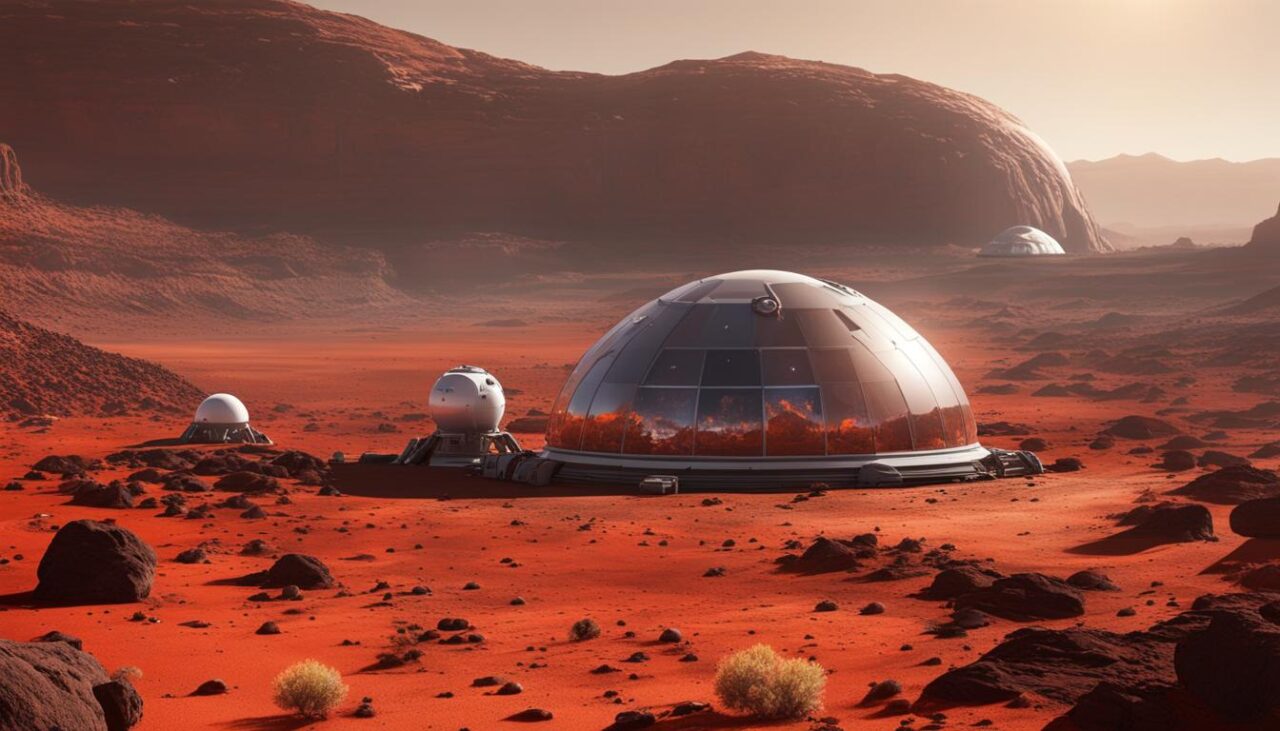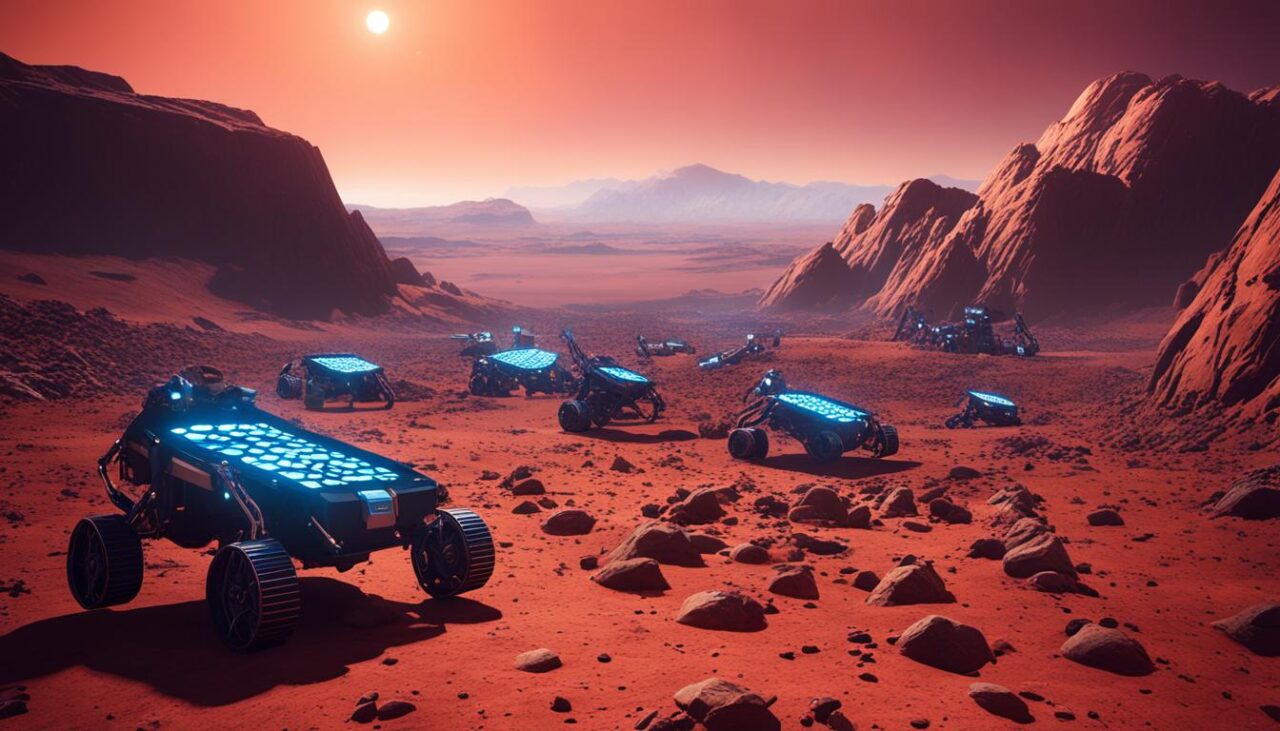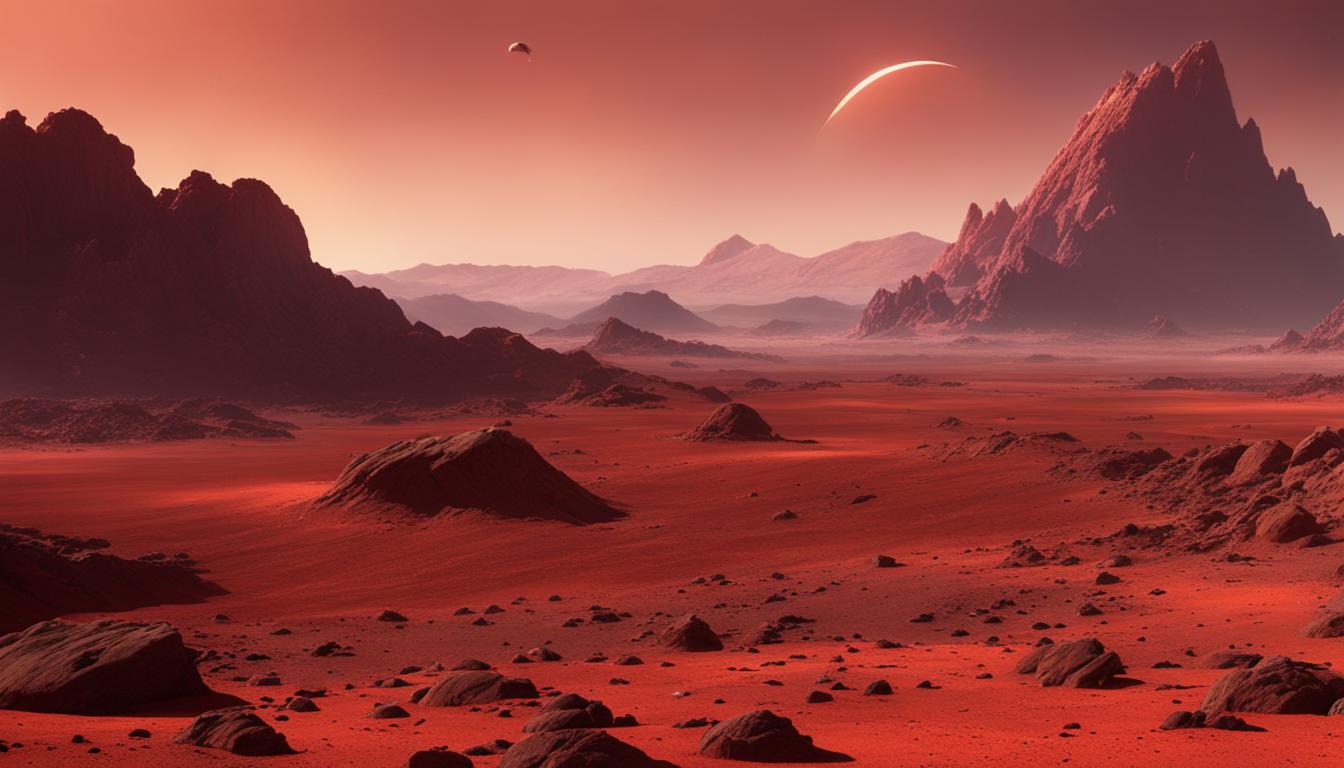Mars is a planet that has fascinated humans for centuries due to its proximity and potential habitability. In recent years, Mars colonization has become a topic of intense interest in the scientific community, with numerous initiatives in progress to establish human settlements on the Red Planet. The possibility of sustainable living and the prospect of new discoveries through space exploration have driven the quest for Mars colonization.
As we venture into this new frontier, it is essential to contemplate the implications of Mars colonization on our future and the future of our species as a multi-planetary civilization. In this article, we will delve into the motivations behind Mars colonization, the challenges of space travel, creating habitable environments, utilizing Martian resources, terraforming Mars, and the importance of a future interplanetary society.
Key Takeaways
- Mars colonization is an exciting possibility for sustainable living and space exploration.
- The development of space habitats and life support systems is crucial for human settlement on Mars.
- Martian resources could support the creation of a self-sufficient colony.
- Terraforming Mars to resemble Earth's atmosphere and climate is a future possibility and invites ethical implications.
- Mars colonization could drive advancements in technology, space exploration, and inspire a new era of human progress.
The Quest for Human Settlement on Mars
The idea of colonizing Mars has captured the imagination of scientists and space enthusiasts for decades. The thought of expanding our human presence beyond Earth is an exciting prospect, but it comes with its own set of challenges. One of the primary motivations behind establishing human settlements on Mars is to ensure the continuity of our species. By creating a second home on another planet, we can mitigate the risk of extinction due to natural or man-made disasters that may befall Earth.
Mars presents many advantages as a potential site for a human settlement. It has a similar day-night cycle to Earth, a surface area equivalent to all of Earth's continents, and a carbon dioxide-rich atmosphere that can be used to produce oxygen. However, the journey to Mars is long and fraught with danger. Humans have never traveled beyond low Earth orbit, and the technological advancements required for long-duration missions are still being developed.
The human body is not naturally adapted to space travel, and prolonged exposure to zero-gravity environments can cause a range of health problems, including bone loss, muscle atrophy, and vision impairment. Crewed missions to Mars will require innovative solutions to provide adequate protection from the harsh conditions of space. NASA and other space agencies are working on developing spacecraft and habitats that can withstand the rigors of deep space travel.
Another significant challenge for Mars colonization is the development of sustainable life-support systems. Living on Mars will require a self-sufficient closed-loop system that can produce food, water, and oxygen with minimal input from Earth. The use of advanced technology such as aquaponics, hydroponics, and aeroponics is being explored to create a sustainable ecosystem on Mars.
“Heading to Mars represents an important step in building a sustainable future for humanity” – Elon Musk
Creating Habitable Space on the Red Planet
The success of establishing a human presence on Mars depends on the development of space habitats and life support systems that can sustain life in the harsh Martian environment. One approach is the use of inflatable modules that can be transported to Mars and inflated upon arrival, providing living space for astronauts. Another method is the concept of 3D printing, where local resources can be used to create habitats and structures.
Designing effective space habitat systems requires careful consideration of factors such as radiation protection, temperature control, and breathable air. One strategy is to use regolith, a loose soil found on Mars, as a radiation shield. Another is to use materials such as graphene to create breathable air from Martian carbon dioxide.
Developing sophisticated life support systems is also critical for the long-term survival of humans on Mars. Recycling technologies can be used to reclaim water, oxygen, and other resources, while hydroponics systems can provide a sustainable source of fresh food.

“Our ultimate aim is to establish self-sufficient Martian colonies that can sustain human life for generations to come.” – Elon Musk
Harnessing Martian Resources for Sustainability
As humans venture out to Mars, the utilization of Martian resources becomes increasingly important. Resource extraction, utilization, and recycling are key components of a self-sufficient colony. Water, for instance, is critical for human survival, and Mars has abundant water resources in the form of ice caps and underground aquifers. Mining ice for its water content could provide an invaluable resource for future colonies.
Martian soil, also known as regolith, is another vital resource as it contains various minerals that could be used for building materials and manufacturing. The regolith could also be utilized as a radiation shield to protect humans from harmful cosmic radiation.
“Martian resources hold the key to unlocking a sustainable future for human civilization on Mars, but we must use these resources wisely and responsibly.”
Furthermore, utilizing Martian resources for sustainable living is not only economically feasible but also environmentally responsible. Using local resources reduces the need to transport materials from Earth to Mars, ultimately reducing the carbon footprint of space travel.
Moreover, the utilization of Martian resources aligns with the idea of creating a sustainable living environment on Mars. A self-sufficient and resourceful colony that minimizes its reliance on Earth's resources would undoubtedly be a crucial step towards long-term Martian colonization and survival.
The Importance of Resource Recycling
Another critical aspect of utilizing Martian resources for sustainable living is recycling. Recycling is key to reducing waste and maximizing resource efficiency in a closed environment such as a space colony. By practising resource recycling, future colonies on Mars could maximize resource utilization, minimize waste, and eventually achieve a closed-loop system of resource management.
In summary, the use of Martian resources is a crucial component of successful Mars colonization and the realization of a sustainable living environment on the red planet. With responsible resource utilization and recycling practices, a self-sufficient Martian colony could be a significant stepping stone in expanding our interplanetary society and securing a future for human civilization beyond Earth.
Terraforming Mars: A Future Possibility
As we continue to advance our knowledge and technology, the idea of terraforming Mars becomes increasingly plausible. Terraforming refers to the process of transforming a planet's environment to make it more hospitable for human life. In the case of Mars, this would involve altering its atmosphere and climate to closely resemble that of Earth.
One of the most significant benefits of terraforming Mars is the opportunity to create a self-sufficient, multi-planetary society. By transforming Mars into a habitable world, we could establish a new home for humans, independent of Earth. This ambitious endeavor could safeguard our species against the risks of catastrophes such as pandemics, wars, or natural disasters on our home planet.

However, terraforming Mars raises serious ethical considerations, including the potential impact on the planet's existing ecosystem and the potential danger of introducing human diseases to a foreign environment. It is crucial to carefully weigh these concerns and approach the process of terraforming with caution and care.
Despite these challenges, the potential for terraforming Mars represents an exciting possibility for the advancement of our interplanetary society. This endeavor would require tremendous resources, technology, and sustained effort, but the rewards could be immeasurable in terms of the preservation of our species and the continued exploration and expansion of the cosmos.
The Interplanetary Society and the Future of Our Species
As we embark on the ambitious goal of Mars colonization, we open up the possibility of creating an interplanetary society that spans beyond our Earthly boundaries. The establishment of a human settlement on Mars would drive advancements in technology, space exploration, and inspire a new era of human progress.
The potential development of an interplanetary society could lead to a broader perspective of our place in the universe, as well as advancements in space travel that could ultimately lead to the colonization of other planets in our solar system and beyond.
However, there are also significant ethical considerations that come with becoming a multi-planetary species. We must ensure that our expansion beyond Earth does not come at the expense of our environment or the rights of those who call other planets their home. Additionally, we must utilize sustainable living practices to ensure the long-term survival of our Mars colony, as well as any potential future multi-planetary societies.
“Exploration is part of human nature, and to be restrained from exploring is to be restrained from being human.” – Robert D. Ballard
As we look to the future of our species, Mars colonization and the possibility of an interplanetary society represents an exciting opportunity for human progress and exploration beyond our wildest dreams. It is up to us to ensure that we approach this new frontier with careful consideration and responsible action to ensure a sustainable and ethical future for all.
Conclusion
In conclusion, Mars colonization represents a new frontier for humanity, with the potential to unlock unprecedented possibilities for sustainable living and space exploration. As the challenges of climate change, resource depletion and population growth continue to mount, establishing a self-sufficient colony on Mars offers a tantalizing glimpse into a future where our species thrives.
The pursuit of Mars colonization requires us to draw upon our collective ingenuity and the cutting-edge technology that we possess. By creating habitable environments, harnessing Martian resources, and exploring the possibility of terraforming, we can pave the way for a sustainable future on the red planet.
Moreover, Mars colonization presents an opportunity to establish an interplanetary society, uniting humanity towards a common goal of exploring the unknown and expanding our horizons. As we take the first steps towards Mars, we are venturing towards a future in which our species transcends the limits of this world and becomes a multi-planetary civilization.
As we reflect on the future of Mars colonization, we must remain mindful of the ethical implications of our actions. It is imperative to ensure that our efforts towards Mars colonization are grounded in sustainability, environmental stewardship, and responsible resource management. By doing so, we can create a future that is not only bold and daring but also responsible and equitable for all.
With the advent of Mars colonization, we stand at the cusp of a new era of human progress. The future is bright, filled with limitless possibilities, and it all begins with Mars.

